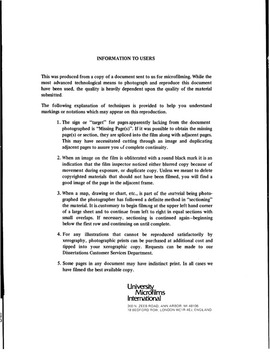| dc.contributor.author | Dotson, David Wendell, | en_US |
| dc.date.accessioned | 2013-08-16T12:28:05Z | |
| dc.date.available | 2013-08-16T12:28:05Z | |
| dc.date.issued | 1980 | en_US |
| dc.identifier.uri | https://hdl.handle.net/11244/4745 | |
| dc.description.abstract | Analysis of Lodge's career not only provided insight into the process of political apprenticeship in nineteenth century America but also contributed to an understanding of the evolution of political conservatism. Lodge's change from a conservative defender of American fishing rights in 1886 to an attitude of expansionism in 1898 was representative of the growing nationalism of the last decade of the century. | en_US |
| dc.description.abstract | While the biography began with Lodge's birth in 1850, the focus was on the period, 1882-1901. In those years, Lodge changed from a reform-minded, Liberal Republican to a Republican party loyalist. Lodge's rapid rise in stature in Congress placed him at the center of national politics in the crucial decade of the 1890's, but he remained essentially a regional figure with his loyalties most firmly attached to the interests of Massachusetts and New England. | en_US |
| dc.description.abstract | This study placed Henry Cabot Lodge in the context of Gilded Age politics both in the nation and in Massachusetts. Lodge was interpreted as a Neo-Hamiltonian conservative who attempted to bridge the change from the politics of William McKinley to the politics of Theodore Roosevelt. | en_US |
| dc.format.extent | iii, 403 leaves ; | en_US |
| dc.subject | History, United States. | en_US |
| dc.title | Henry Cabot Lodge : | en_US |
| dc.type | Thesis | en_US |
| dc.thesis.degree | Ph.D. | en_US |
| dc.thesis.degreeDiscipline | Department of History | en_US |
| dc.note | Source: Dissertation Abstracts International, Volume: 41-05, Section: A, page: 2258. | en_US |
| ou.identifier | (UMI)AAI8024413 | en_US |
| ou.group | College of Arts and Sciences::Department of History | |
